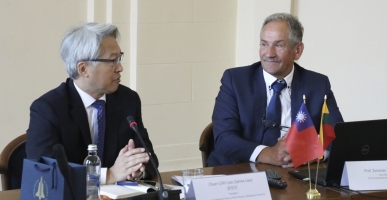Events
Guests from Academia Sinica at the Lithuanian Academy of Sciences
25 07 2023
On 24 July, the Lithuanian Academy of Sciences hosted a nine-member delegation from Academia Sinica, the academy of sciences of Taiwan, led by its president Chun-Chih Liao. The meeting, which was aimed at strengthening scientific cooperation between the countries, was moderated by Prof. Zenonas Dabkevičius, vice-president of the Lithuanian Academy of Sciences, and attended by academicians Gintautas Dzemyda, Romas Baronas, Gediminas Račiukaitis, Gintaras Valušis, also Dr Ieva Plikusienė, chair of the Young Academy of the Lithuanian Academy of Sciences, Dr Andrius Bernotas, head of the Organising Department, and Violeta Skirgailienė, chief specialist for international relations. The Taiwanese academicians were accompanied by Eric Huang, head of the Taiwanese representative office in Lithuania, and Da-Chuan Cheng, executive director of its Science and Technology Division.
At the beginning of the event, the vice-president of the Lithuanian Academy of Sciences thanked Chun-Chin Liao, president of Academia Sinica, for the hospitality shown in Taiwan last year and presented the activities of the Academy, its history, and the changes that have taken place since the restoration of independence. Gintaras Valušis, head of the Centre for Physical Sciences and Technology, stressed that the science ecosystem of Taiwan is a good example of how scientific knowledge can be effectively translated into high-tech products. Dr Gediminas Račiukaitis, president of the Lithuanian Laser Association, pointed out that the laser sector and the technologies it develops have become one of the cores of smart specialisation in our country. Lithuanians are also renowned for developing the most powerful lasers for international science projects such as ELI (Extreme Light Infrastructure). In addition, a cooperation agreement has recently been signed with the laser research centre ITRI in Taiwan. A Lithuanian laser centre will be opened there in September. Taiwan provided funding for the facilities and the professionals to be employed in the centre, while the Lithuanian side supplied equipment to showcase Lithuanian laser technology and attract potential customers.
.jpg) Participants of the meeting
Participants of the meeting
Science and Digital Technologies at Vilnius University, added that the majority of the members of the Lithuanian Academy of Sciences are active researchers working in universities and research centres. Together with partners, the Academy organises local and international conferences in the field of data science. Romas Baronas, the recent chair of the Research Council of Lithuania, also gave an example of the strengthening links with Taiwanese scientists. He visited China Medical University in Taiwan in spring. Lithuanian researchers intend to collaborate in big data processing and analysis. Ieva Plikusienė spoke of aims and activities of the Young Academy of the Lithuanian Academy of Sciences. One of the key objectives of the Young Academy is to strengthen the influence of young scientists on the country's research and its organisation.
Prof. Chun-Chih Liao stressed that the aim of their delegation was to share ideas and learn about the Lithuanian system of research organisation in order to encourage cooperation. Presenting the activities of Academia Sinica, he said that more than 8,600 scientists, postdoctoral fellows, students, and other staff work in its institutes. The annual budget of Academia Sinica is USD 520 million. It aims to attract and nurture talent, to strengthen the scientists’ social responsibility towards society, and to foster cooperation within the country and internationally. The organisation brings together 277 academicians.
Academia Sinica has launched a new international graduate programme to promote international cooperation and support postdoctoral research in Taiwan. Ukrainian scientists will also be supported by inviting a group of them to work in Taiwan.
In the discussion that followed the presentations, Dr Plikusienė was interested in how Lithuanian researchers could benefit from this graduate support programme, and the guests from Taiwan explained that it was not difficult: study visits of a few months or longer can be supported. They explained that one of the aims of their visit was to discuss how to make the international cooperation programme work most effectively. Later, the attendees of this meeting discussed in greater detail the practical aspects of cooperation and research funding. The discussions will continue at the meetings in the science centres of Lithuania. With 32 institutes and research centres and its own budget, Academia Sinica decides independently what it supports and how it cooperates.
Prepared by Dr Rolandas Maskoliūnas and Dr Andrius Bernotas
Translated by Diana Barnard
Photos by Sandra Tamulionienė
